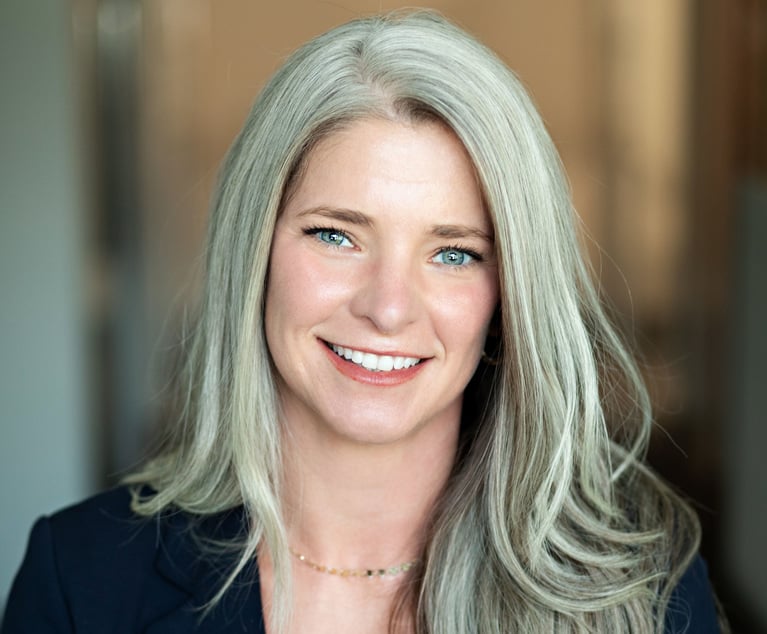National Women in Law Awards: Roberta “Bobbi” Liebenberg
Senior PartnerFine, Kaplan and Black
December 03, 2018 at 07:00 AM
4 minute read

Teaching students in an inner-city Detroit high school and later in a school in rural Maryland in the early 1970s opened Roberta “Bobbi” Liebenberg's eyes to inequities in education funding and led her to change her career to law.
Liebenberg said she had been hired to teach anthropology, social studies and math but soon discovered the impossibility of her assignment. “Most of my students couldn't read,” she said. “What motivated me was seeing these economic inequalities. To really move the needle, I wanted to do more.”
Liebenberg, now senior partner in Fine, Kaplan and Black in Philadelphia, enrolled in Catholic University of America Columbus School of Law but faced challenges in getting her J.D. “I had my first child in law school,” Liebenberg said.
Accompanied by her baby, Liebenberg drove frequently to Richmond, Virginia, where her husband, Robert, was in a medical residency program. After graduating from law school in 1975, Liebenberg clerked for the U.S. Court of Appeals for the Fourth Circuit. Not many women were practicing law at that time, Liebenberg said. She was asked some unusual questions when she interviewed with law firms.
“My favorite question was, would you cry if a judge yelled at you?” Liebenberg said. Her response: “Would it help the client? I could totally cry if that would help.”
Liebenberg said she was the first female attorney in Hunton & Williams' antitrust department in Richmond. While there, Liebenberg banded with other women to form the Metropolitan Richmond Women's Bar Association for which she served as president in 1976 and 1977. Returning to Philadelphia in the late 1970s, Liebenberg became a partner in Wolf Block Schorr & Solis-Cohen. In 1992, Liebenberg co-founded Mager, Liebenberg & White, the first all women-owned law firm in Philadelphia to focus on complex commercial litigation. It was the Year of the Woman, and “a very exciting time,” she said. Her family responsibilities also were increasing; she had three children by that time.
Liebenberg said she received “too good an offer to pass up” in 2000, when she joined Fine Kaplan and Black. Over the years she has worked on a number of major cases, including serving as a trial counsel for the plaintiff class in In re Urethane (Polyether Polyols) Antitrust Litigation tried in federal court in Kansas City in 2013. The jury's verdict against Dow Chemical was tripled for a $1.06 billion award, the largest judgment ever in a price-fixing case in the United States.
In addition to her skills as an attorney, Liebenberg has served as a leader in efforts to advance women in the legal profession, working with numerous national, state and local bar associations and other organizations. She was appointed as a leader-in-residence at the Center for Women in Law at the University of Texas School of Law and has twice chaired the ABA's Commission on Women in the Profession. “I'm the only one to have done that,” she said.
Liebenberg co-founded and has served for the past five years as chair of DirectWomen, which is dedicated to increasing the representation of women attorneys on public company boards. The Pennsylvania Supreme Court also appointed her as co-chair of the Interbranch Commission for Gender, Racial and Ethnic Fairness.
In 2015, Liebenberg co-authored “First Chairs at Trial: More Women Need Seats at the Table,” a first-of-its-kind empirical study of the participation of men and women as lead counsel and trial attorneys in civil and criminal litigation. Liebenberg also currently co-chairs the ABA Presidential Initiative on Achieving Long Term Careers in Law for Women.
Pat Gillette, a San Francisco-based lawyer, mediator, author and speaker on gender diversity and equality, has worked with Liebenberg on gender-related issues. Gillette said Liebenberg is “a mover and a shaker” who makes things happen. Liebenberg does not just note a problem and write about it. “She gathers together her possible solutions,” Gillette added.
This content has been archived. It is available through our partners, LexisNexis® and Bloomberg Law.
To view this content, please continue to their sites.
Not a Lexis Subscriber?
Subscribe Now
Not a Bloomberg Law Subscriber?
Subscribe Now
NOT FOR REPRINT
© 2024 ALM Global, LLC, All Rights Reserved. Request academic re-use from www.copyright.com. All other uses, submit a request to [email protected]. For more information visit Asset & Logo Licensing.
You Might Like
View All
'The Show Must Go On': Solo-GC-of-Year Kevin Colby Pulls Off Perpetual Juggling Act

Contract Software Unicorn Ironclad Hires Former Pinterest Lawyer as GC
2 minute read
How Amy Harris Leverages Diversity to Give UMB Financial a Competitive Edge
5 minute read
Auditor Finds 'Significant Deficiency' in FTC Accounting to Tune of $7M
4 minute readTrending Stories
- 1Gibson Dunn Sued By Crypto Client After Lateral Hire Causes Conflict of Interest
- 2Trump's Solicitor General Expected to 'Flip' Prelogar's Positions at Supreme Court
- 3Pharmacy Lawyers See Promise in NY Regulator's Curbs on PBM Industry
- 4Outgoing USPTO Director Kathi Vidal: ‘We All Want the Country to Be in a Better Place’
- 5Supreme Court Will Review Constitutionality Of FCC's Universal Service Fund
Who Got The Work
Michael G. Bongiorno, Andrew Scott Dulberg and Elizabeth E. Driscoll from Wilmer Cutler Pickering Hale and Dorr have stepped in to represent Symbotic Inc., an A.I.-enabled technology platform that focuses on increasing supply chain efficiency, and other defendants in a pending shareholder derivative lawsuit. The case, filed Oct. 2 in Massachusetts District Court by the Brown Law Firm on behalf of Stephen Austen, accuses certain officers and directors of misleading investors in regard to Symbotic's potential for margin growth by failing to disclose that the company was not equipped to timely deploy its systems or manage expenses through project delays. The case, assigned to U.S. District Judge Nathaniel M. Gorton, is 1:24-cv-12522, Austen v. Cohen et al.
Who Got The Work
Edmund Polubinski and Marie Killmond of Davis Polk & Wardwell have entered appearances for data platform software development company MongoDB and other defendants in a pending shareholder derivative lawsuit. The action, filed Oct. 7 in New York Southern District Court by the Brown Law Firm, accuses the company's directors and/or officers of falsely expressing confidence in the company’s restructuring of its sales incentive plan and downplaying the severity of decreases in its upfront commitments. The case is 1:24-cv-07594, Roy v. Ittycheria et al.
Who Got The Work
Amy O. Bruchs and Kurt F. Ellison of Michael Best & Friedrich have entered appearances for Epic Systems Corp. in a pending employment discrimination lawsuit. The suit was filed Sept. 7 in Wisconsin Western District Court by Levine Eisberner LLC and Siri & Glimstad on behalf of a project manager who claims that he was wrongfully terminated after applying for a religious exemption to the defendant's COVID-19 vaccine mandate. The case, assigned to U.S. Magistrate Judge Anita Marie Boor, is 3:24-cv-00630, Secker, Nathan v. Epic Systems Corporation.
Who Got The Work
David X. Sullivan, Thomas J. Finn and Gregory A. Hall from McCarter & English have entered appearances for Sunrun Installation Services in a pending civil rights lawsuit. The complaint was filed Sept. 4 in Connecticut District Court by attorney Robert M. Berke on behalf of former employee George Edward Steins, who was arrested and charged with employing an unregistered home improvement salesperson. The complaint alleges that had Sunrun informed the Connecticut Department of Consumer Protection that the plaintiff's employment had ended in 2017 and that he no longer held Sunrun's home improvement contractor license, he would not have been hit with charges, which were dismissed in May 2024. The case, assigned to U.S. District Judge Jeffrey A. Meyer, is 3:24-cv-01423, Steins v. Sunrun, Inc. et al.
Who Got The Work
Greenberg Traurig shareholder Joshua L. Raskin has entered an appearance for boohoo.com UK Ltd. in a pending patent infringement lawsuit. The suit, filed Sept. 3 in Texas Eastern District Court by Rozier Hardt McDonough on behalf of Alto Dynamics, asserts five patents related to an online shopping platform. The case, assigned to U.S. District Judge Rodney Gilstrap, is 2:24-cv-00719, Alto Dynamics, LLC v. boohoo.com UK Limited.
Featured Firms
Law Offices of Gary Martin Hays & Associates, P.C.
(470) 294-1674
Law Offices of Mark E. Salomone
(857) 444-6468
Smith & Hassler
(713) 739-1250






